倒装
图片预览
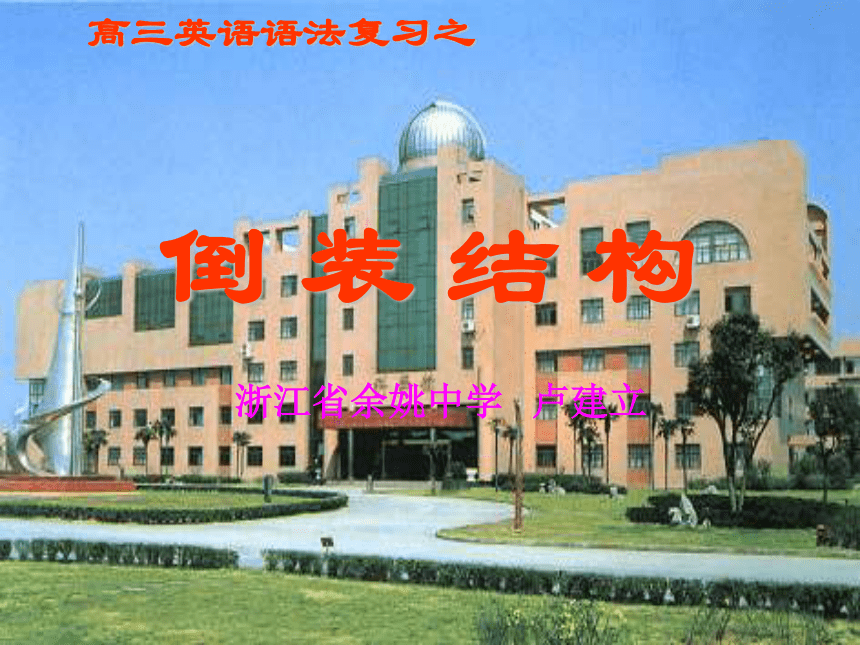
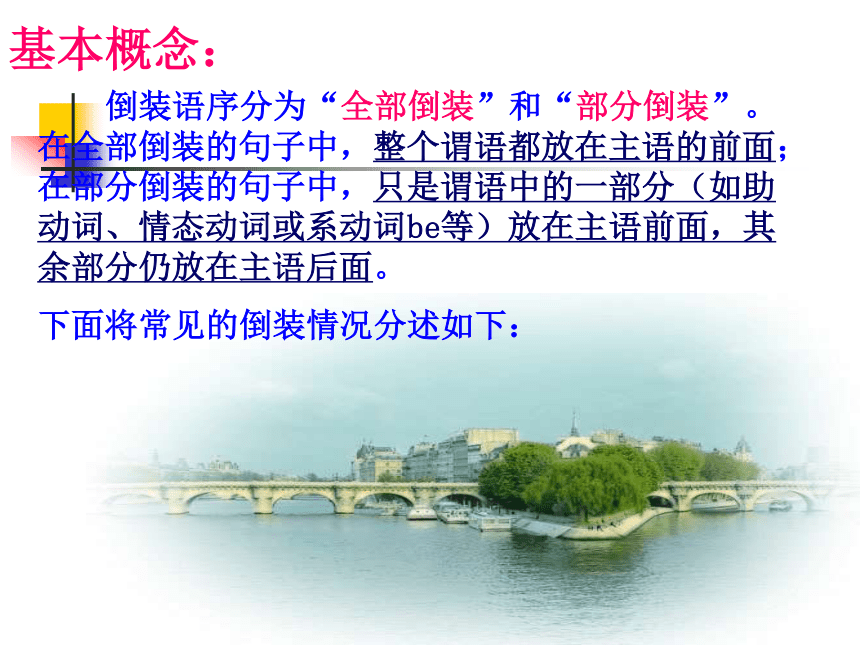
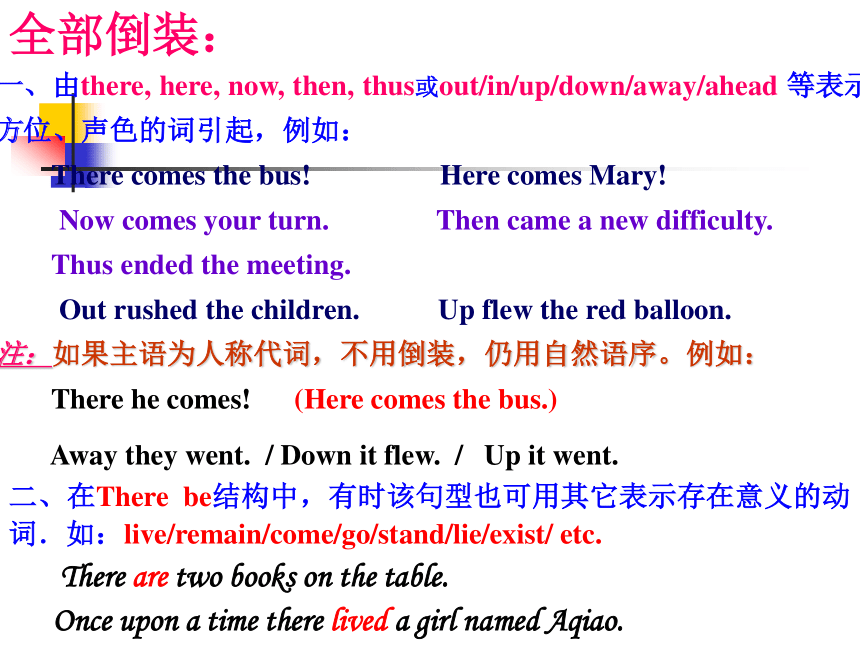
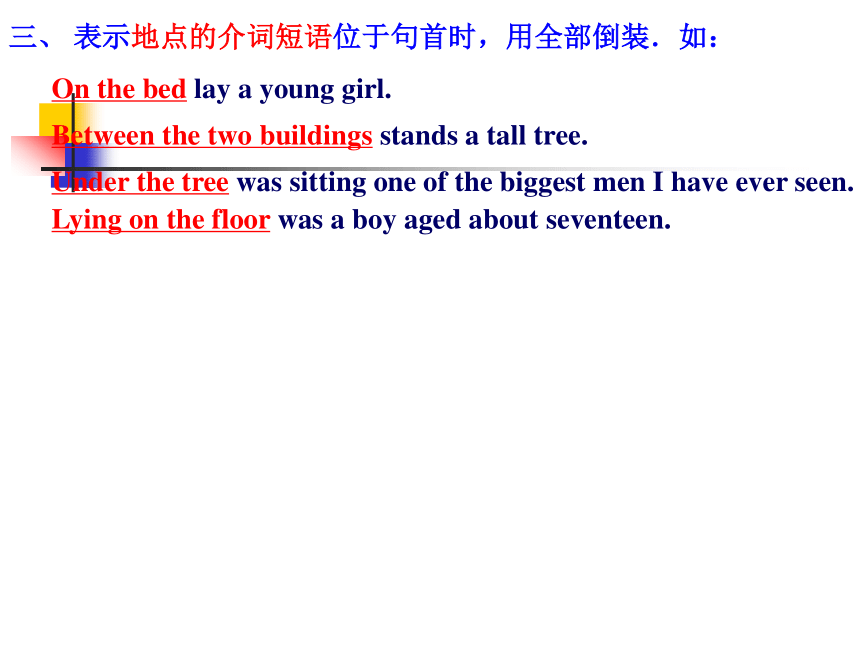
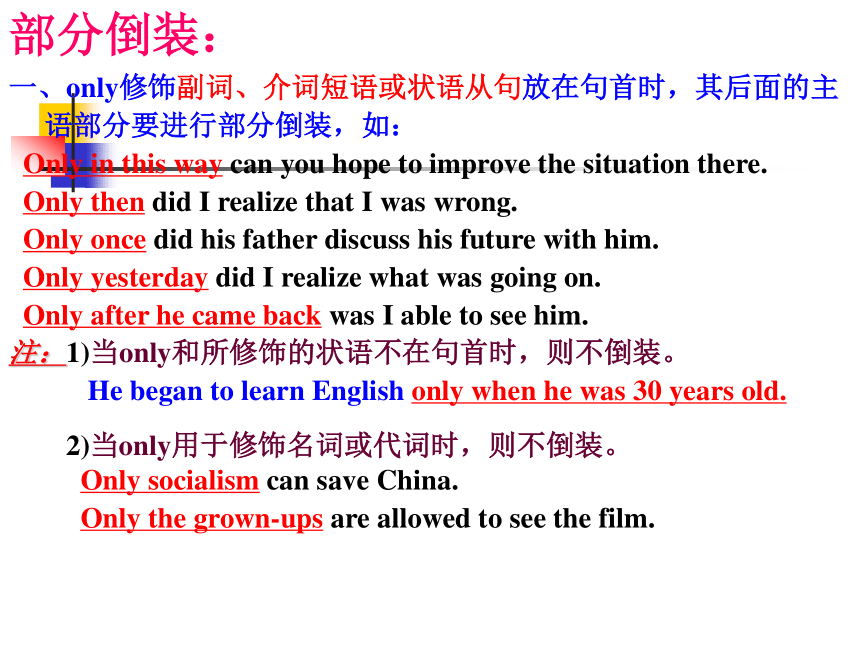
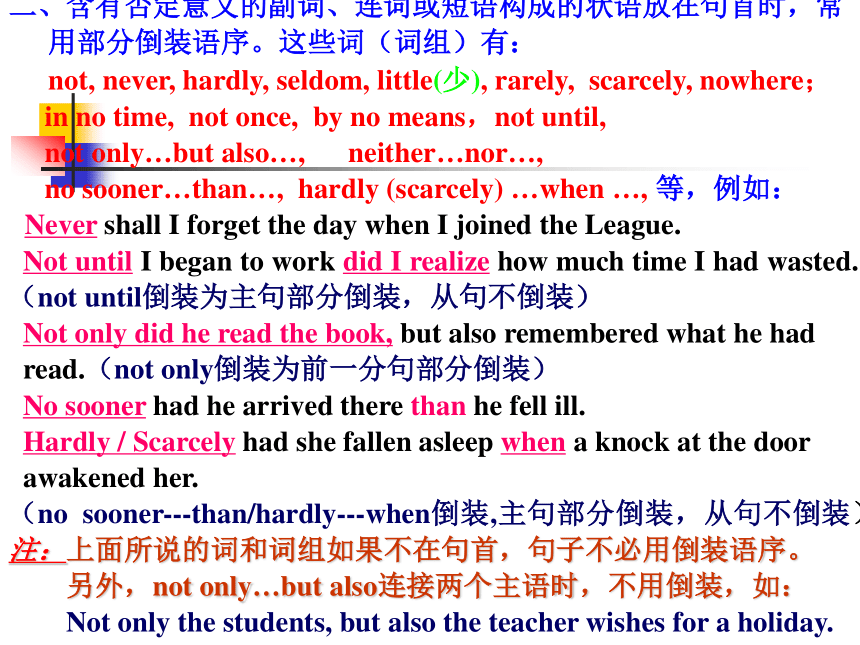
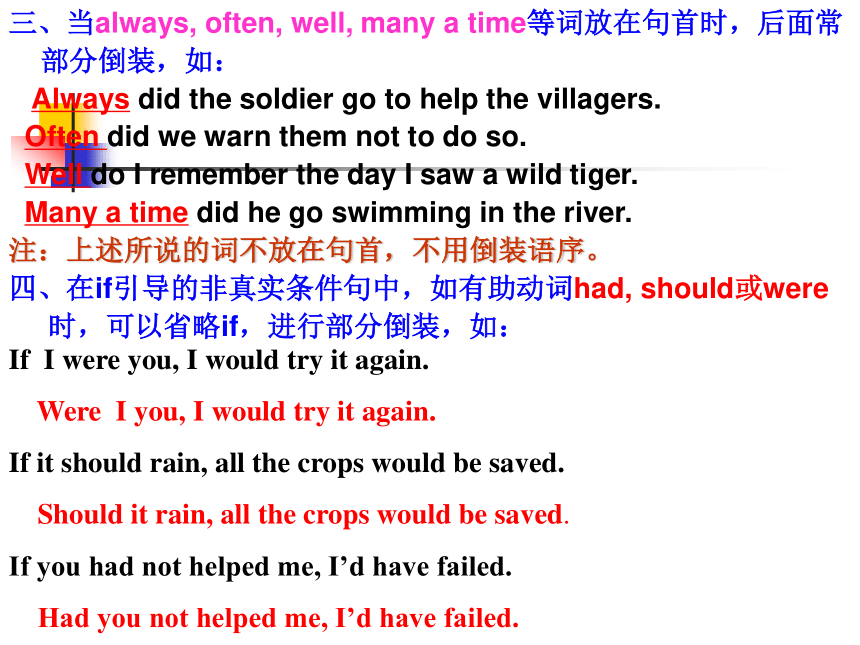
文档简介
课件17张PPT。高三英语语法复习之浙江省余姚中学 卢建立倒 装 结 构 倒装语序分为“全部倒装”和“部分倒装”。在全部倒装的句子中,整个谓语都放在主语的前面;在部分倒装的句子中,只是谓语中的一部分(如助动词、情态动词或系动词be等)放在主语前面,其余部分仍放在主语后面。
下面将常见的倒装情况分述如下: 基本概念:一、由there, here, now, then, thus或out/in/up/down/away/ahead 等表示方位、声色的词引起,例如:
There comes the bus! Here comes Mary!
Now comes your turn. Then came a new difficulty.
Thus ended the meeting.
Out rushed the children. Up flew the red balloon.
注:如果主语为人称代词,不用倒装,仍用自然语序。例如:
There he comes! (Here comes the bus.)
Away they went. / Down it flew. / Up it went.全部倒装:二、在There be结构中,有时该句型也可用其它表示存在意义的动词.如:live/remain/come/go/stand/lie/exist/ etc.
There are two books on the table.
Once upon a time there lived a girl named Aqiao.三、 表示地点的介词短语位于句首时,用全部倒装.如:
On the bed lay a young girl.
Between the two buildings stands a tall tree.
Under the tree was sitting one of the biggest men I have ever seen.
Lying on the floor was a boy aged about seventeen.
部分倒装:一、only修饰副词、介词短语或状语从句放在句首时,其后面的主
语部分要进行部分倒装,如:
Only in this way can you hope to improve the situation there.
Only then did I realize that I was wrong.
Only once did his father discuss his future with him.
Only yesterday did I realize what was going on.
Only after he came back was I able to see him.
注:1)当only和所修饰的状语不在句首时,则不倒装。
He began to learn English only when he was 30 years old.
2)当only用于修饰名词或代词时,则不倒装。
Only socialism can save China.
Only the grown-ups are allowed to see the film.
二、含有否定意义的副词、连词或短语构成的状语放在句首时,常
用部分倒装语序。这些词(词组)有:
not, never, hardly, seldom, little(少), rarely, scarcely, nowhere;
in no time, not once, by no means,not until,
not only…but also…, neither…nor…,
no sooner…than…, hardly (scarcely) …when …, 等,例如:
Never shall I forget the day when I joined the League.
Not until I began to work did I realize how much time I had wasted.
(not until倒装为主句部分倒装,从句不倒装)
Not only did he read the book, but also remembered what he had
read.(not only倒装为前一分句部分倒装)
No sooner had he arrived there than he fell ill.
Hardly / Scarcely had she fallen asleep when a knock at the door
awakened her.
(no sooner---than/hardly---when倒装,主句部分倒装,从句不倒装)
注:上面所说的词和词组如果不在句首,句子不必用倒装语序。
另外,not only…but also连接两个主语时,不用倒装,如:
Not only the students, but also the teacher wishes for a holiday.三、当always, often, well, many a time等词放在句首时,后面常
部分倒装,如:
Always did the soldier go to help the villagers.
Often did we warn them not to do so.
Well do I remember the day I saw a wild tiger.
Many a time did he go swimming in the river.
注:上述所说的词不放在句首,不用倒装语序。四、在if引导的非真实条件句中,如有助动词had, should或were
时,可以省略if,进行部分倒装,如: If I were you, I would try it again.
Were I you, I would try it again.
If it should rain, all the crops would be saved.
Should it rain, all the crops would be saved.
If you had not helped me, I’d have failed.
Had you not helped me, I’d have failed.
五、由副词so, neither, nor开头的句子。表示前面所说的情况也
(不)适用于另一个人(或物),其句型是:
so/neither/nor+be(have,助动词或情态动词)+主语。如:
He plays the violin quite well. So does my sister.
He has been to Beijing, so have I.
--Do you know Jim quarreled with his brother?
--I don’t know, nor do I care.
注:尽管用so开头,但当so引出的句子用以对上文内容加以证实或肯定时,意为“的确如此”,不可用倒装结构。如:
-- It was cold yesterday. – So it was!
-- Tomorrow will be Monday. – So it will. 若前面为两个或两个以上的分句,表示不同的主语与前面有关的各种情况相同,用:so it is/was (the same) with +主语
--I seldom watch TV, but listen to the radio a lot.
--So it is with me.六、当so(或such)…that…结构中的so或such用于句首时,要
采取部分倒装语序,如:
So loudly did he speak that even people in the next room
could hear him.
So small was the mark that I could hardly see it.
Such was his strength that he could bend iron bars.
注:such和be连用作表语时,也常用倒装语序,如:
Such was the result.
Such were her words.
Such was the story he told.1)形容词/名词/动词+as/though引导的让步状语从句中
(如表语是名词,名词前不加任何冠词)
Old as he is, he is full of energy.
Clever though he is, he is not proud.
Try as he would, he might fail again.
Child as he was, he had to make a living.
(但:as/though句首时,不倒装: Though he is clever, he is not proud.)
其它特殊类型的倒装2) 在May….或Long live….开头的表示祝愿的句子
May you succeed!
Long live the king!3)在the more…,the more这种结构中,从句在前,主句在后,
主句可以用倒装句结构。
The more you practice, the better is your skill.
The harder you work, the better result can you get. 1. Only when ___ 30 years old ___ to learn English.
was he; did he began B. he was; he began
C. was he; he began D. he was; did he begin练习题:D2. Not only _ repair bikes but he _ repair televisions.
A. he can; also can B. he can; can also
C. can he; also can D. can he; can alsoD3. ___ seen him before; ___ tell you his name.
A. Never have I; how I can
B. I have never; how I can
C. Never have I; how can I
D. I never have; how can IC4. — Why can't I smoke here?
— At no time _______ in the meeting-room.
A. is smoking permitted
B. smoking is permitted
C. smoking is it permitted
D. does smoking permitA5. Not until I began to work ___ how much time I had wasted.
A. didn’t I realize B. did I realize
C. I didn’t realize D. I realizedB6. No sooner had he finished his talk ___ he was surrounded by the workers.
A. as B. then C. than D. whenC7. --David has made great progress recently.
--_____, and ____.
A. So he has; so you have
B. So he has; so have you
C. So has he; so have you
D. So has he; so you haveB8. --I seldom watch TV, but listen to the radio a lot.
--___.
A. So do I. B. Neither do I
C. I’m the same. D. So it is with me.D9. --Do you know Jim quarreled with his brother?
--I don’t know, _____.
A. nor don’t I care B. nor do I care
C. I don’t care neither D. I don’t care alsoB10. So ___ that no fish can live in it.
A. the lake is shallow B. shallow the lake is
C. shallow is the lake D. is the lake shallowCThank you!
下面将常见的倒装情况分述如下: 基本概念:一、由there, here, now, then, thus或out/in/up/down/away/ahead 等表示方位、声色的词引起,例如:
There comes the bus! Here comes Mary!
Now comes your turn. Then came a new difficulty.
Thus ended the meeting.
Out rushed the children. Up flew the red balloon.
注:如果主语为人称代词,不用倒装,仍用自然语序。例如:
There he comes! (Here comes the bus.)
Away they went. / Down it flew. / Up it went.全部倒装:二、在There be结构中,有时该句型也可用其它表示存在意义的动词.如:live/remain/come/go/stand/lie/exist/ etc.
There are two books on the table.
Once upon a time there lived a girl named Aqiao.三、 表示地点的介词短语位于句首时,用全部倒装.如:
On the bed lay a young girl.
Between the two buildings stands a tall tree.
Under the tree was sitting one of the biggest men I have ever seen.
Lying on the floor was a boy aged about seventeen.
部分倒装:一、only修饰副词、介词短语或状语从句放在句首时,其后面的主
语部分要进行部分倒装,如:
Only in this way can you hope to improve the situation there.
Only then did I realize that I was wrong.
Only once did his father discuss his future with him.
Only yesterday did I realize what was going on.
Only after he came back was I able to see him.
注:1)当only和所修饰的状语不在句首时,则不倒装。
He began to learn English only when he was 30 years old.
2)当only用于修饰名词或代词时,则不倒装。
Only socialism can save China.
Only the grown-ups are allowed to see the film.
二、含有否定意义的副词、连词或短语构成的状语放在句首时,常
用部分倒装语序。这些词(词组)有:
not, never, hardly, seldom, little(少), rarely, scarcely, nowhere;
in no time, not once, by no means,not until,
not only…but also…, neither…nor…,
no sooner…than…, hardly (scarcely) …when …, 等,例如:
Never shall I forget the day when I joined the League.
Not until I began to work did I realize how much time I had wasted.
(not until倒装为主句部分倒装,从句不倒装)
Not only did he read the book, but also remembered what he had
read.(not only倒装为前一分句部分倒装)
No sooner had he arrived there than he fell ill.
Hardly / Scarcely had she fallen asleep when a knock at the door
awakened her.
(no sooner---than/hardly---when倒装,主句部分倒装,从句不倒装)
注:上面所说的词和词组如果不在句首,句子不必用倒装语序。
另外,not only…but also连接两个主语时,不用倒装,如:
Not only the students, but also the teacher wishes for a holiday.三、当always, often, well, many a time等词放在句首时,后面常
部分倒装,如:
Always did the soldier go to help the villagers.
Often did we warn them not to do so.
Well do I remember the day I saw a wild tiger.
Many a time did he go swimming in the river.
注:上述所说的词不放在句首,不用倒装语序。四、在if引导的非真实条件句中,如有助动词had, should或were
时,可以省略if,进行部分倒装,如: If I were you, I would try it again.
Were I you, I would try it again.
If it should rain, all the crops would be saved.
Should it rain, all the crops would be saved.
If you had not helped me, I’d have failed.
Had you not helped me, I’d have failed.
五、由副词so, neither, nor开头的句子。表示前面所说的情况也
(不)适用于另一个人(或物),其句型是:
so/neither/nor+be(have,助动词或情态动词)+主语。如:
He plays the violin quite well. So does my sister.
He has been to Beijing, so have I.
--Do you know Jim quarreled with his brother?
--I don’t know, nor do I care.
注:尽管用so开头,但当so引出的句子用以对上文内容加以证实或肯定时,意为“的确如此”,不可用倒装结构。如:
-- It was cold yesterday. – So it was!
-- Tomorrow will be Monday. – So it will. 若前面为两个或两个以上的分句,表示不同的主语与前面有关的各种情况相同,用:so it is/was (the same) with +主语
--I seldom watch TV, but listen to the radio a lot.
--So it is with me.六、当so(或such)…that…结构中的so或such用于句首时,要
采取部分倒装语序,如:
So loudly did he speak that even people in the next room
could hear him.
So small was the mark that I could hardly see it.
Such was his strength that he could bend iron bars.
注:such和be连用作表语时,也常用倒装语序,如:
Such was the result.
Such were her words.
Such was the story he told.1)形容词/名词/动词+as/though引导的让步状语从句中
(如表语是名词,名词前不加任何冠词)
Old as he is, he is full of energy.
Clever though he is, he is not proud.
Try as he would, he might fail again.
Child as he was, he had to make a living.
(但:as/though句首时,不倒装: Though he is clever, he is not proud.)
其它特殊类型的倒装2) 在May….或Long live….开头的表示祝愿的句子
May you succeed!
Long live the king!3)在the more…,the more这种结构中,从句在前,主句在后,
主句可以用倒装句结构。
The more you practice, the better is your skill.
The harder you work, the better result can you get. 1. Only when ___ 30 years old ___ to learn English.
was he; did he began B. he was; he began
C. was he; he began D. he was; did he begin练习题:D2. Not only _ repair bikes but he _ repair televisions.
A. he can; also can B. he can; can also
C. can he; also can D. can he; can alsoD3. ___ seen him before; ___ tell you his name.
A. Never have I; how I can
B. I have never; how I can
C. Never have I; how can I
D. I never have; how can IC4. — Why can't I smoke here?
— At no time _______ in the meeting-room.
A. is smoking permitted
B. smoking is permitted
C. smoking is it permitted
D. does smoking permitA5. Not until I began to work ___ how much time I had wasted.
A. didn’t I realize B. did I realize
C. I didn’t realize D. I realizedB6. No sooner had he finished his talk ___ he was surrounded by the workers.
A. as B. then C. than D. whenC7. --David has made great progress recently.
--_____, and ____.
A. So he has; so you have
B. So he has; so have you
C. So has he; so have you
D. So has he; so you haveB8. --I seldom watch TV, but listen to the radio a lot.
--___.
A. So do I. B. Neither do I
C. I’m the same. D. So it is with me.D9. --Do you know Jim quarreled with his brother?
--I don’t know, _____.
A. nor don’t I care B. nor do I care
C. I don’t care neither D. I don’t care alsoB10. So ___ that no fish can live in it.
A. the lake is shallow B. shallow the lake is
C. shallow is the lake D. is the lake shallowCThank you!
